Lor Bak is popular street food in Malaysia, particularly among the Chinese. It is a meat roll wrapped in beancurd skin, seasoning with Chinese five-spice powder, and deep-fry until crispy. Besides being a famous street food sold in every nook and corner, it is also a favored festive dish during the Chinese New Year.
Let’s get into the detail of my favorite Lor Bak recipe.
Other names also refer to the same deli. So If you encounter a Five-spice meat roll, Ngoh Hiang pork roll, loh bak, spice pork roll, and 五香卤肉卷, they are all variation phrases referring to Lor Bak.
Lor Bak should not be confused with loh bak gou, the direct translation of turnip cake, a dim sum dish.
Note: This post may contain affiliate links. Please read my privacy policy for more info. I may receive commissions for purchases made through links in this post. As an Amazon Associate, I earn from qualifying purchases.
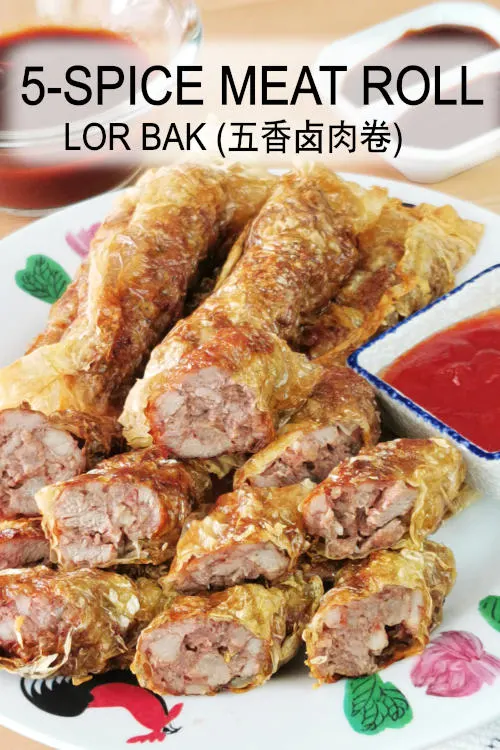
How to make Lor Bak
Lor Bak consists of two components, the meat stuffing and the beancurd sheet.
1. Prepare the stuffing
- Cut the pork into slices, then into thin strips, and finally into small dice. Some cooks prefer to cut it into thin strips to get a more noticeable mouthfeel of the meat texture.
- Clean the shrimp as usual (remove the heads, shells, and devein), then give the shrimp a few rough chops.
- Chop some garlic. Garlic is not an essential ingredient, but I like the flavor.
- Cut the onion into small dice.
- Peel the water chestnuts, and cut them into small pieces.
- Place all the main ingredients into a large mixing bowl.
- Season the ingredients with light soy sauce, ground white pepper, five-spice powder, Shaoxing wine, sugar, and salt.
- Add an egg plus the all-purpose flour.
- Combine all the ingredients thoroughly.
- Set aside to marinate the stuffing for an hour.
Note
- The cut of pork can be either pork shoulder or pork belly. The critical requirement is to have a fair portion of fat, ideally about 1/5 of the total amount of pork. The pork fat helps to make the stuffing more juicy and tender.
- You may use pork alone, but adding some shrimp will make it tastier. Chicken meat is the best substitute for pork to prepare the pork-free Lor Bak.
- Jicama (yam bean) is the substitute for water chestnuts. Cut the yam ben into fine julienne, place them in a cloth bag, and squeeze out the excess water. This step will remove the excess water, making the stuffing too wet.
- I like to cut the meat and shrimp into small dice instead of mincing them finely. By doing so, you can feel the texture of each component in your mouth.
- Five-spice powder is the primary seasoning reflected by the other name of Lor Bak, i.e., Ngoh Hiang, which means five-spice. Therefore, it is clear that you should use the freshest 5-spice powder to make Lor Bak. The best way is to get it from the Chinese grocery store or medicinal shop, which usually makes it fresh. However, if you prefer to purchase it from the supermarket, ensure it bears a long expiry date.
Note: Chinese five-spice powder mainly consists of cinnamon bark, fennel seeds, cloves, star anise, and ground white peppers. However, it can have more than these five ingredients in specific brands.
Variations
- Other popular ingredients for the stuffing are yam beans, spring onions, and mushrooms.
- Other seasonings you can include are oyster sauce, sesame oil, and fish sauce.
- This Ngoh Hiang recipe uses pork which is common in all Chinese recipes. However, you can use chicken breast meat to make the pork-free version.
- Some Lor Bak recipe does not include shrimp but only use pork or chicken meat as the main ingredient.
- ‘Bak’ means meat in Hokkien dialect. Therefore, attempting to make a vegetarian version is not the best option.
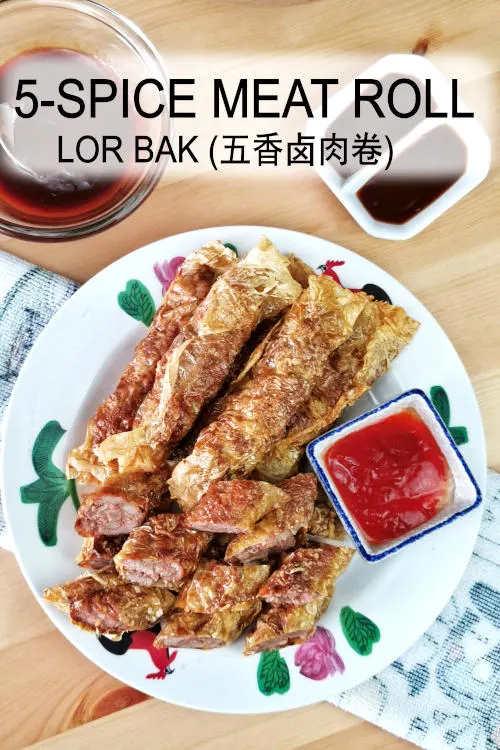
2. Wrap the stuffing with the bean curd sheet
Wrapping the stuffing with the bean curd skin (sheet) is relatively easy compared to making dumplings. All you need is to roll the bean curd skin and flatten both sides.
Note: Beancurd skin 豆腐皮 comes as a large sheet folded into A4 size. It is soft and should not be confused with the crispy bean curd skin called Fu Zhu 腐竹.
Here are the steps:
- Unfold the beancurd sheet on a large working surface.
- Trim off the uneven sides to make it a near-perfect rectangle. Then, you can keep the trimming to cook other vegetarian dishes.
- Cut the beancurd sheet into small pieces, about the size slightly large than your palm, preferably a rectangle.
- Stack up the bean curd sheet and keep it in an airtight container or cover it with a damp cloth to prevent them from drying out.
- Use a clean damp cloth to wipe or apply some water with a brush to the bean curd sheet to soften it before using it to wrap the stuffing.
- Place a portion of the stuffing near one end of the shorter sides of the beancurd sheet. The filling should have half an inch clearance from the sides.
- Prepare a thick cornstarch slurry with two teaspoons each of the cornstarch and cold water.
- Apply the starch slurry to all sides of the bean curd sheet. It works as glue to secure the folding, preventing it from opening up during deep-frying.
- Roll up the bean curd sheet to encase the stuffing.
- Flatten both sides to seal the stuffing inside the bean curd sheet.
Note:
- You can use tapioca starch to make the slurry instead of cornstarch.
- The shape of the meat rolls this recipe is how most hawkers in Malaysia are prepared. But, of course, you can make other shapes as you wish.
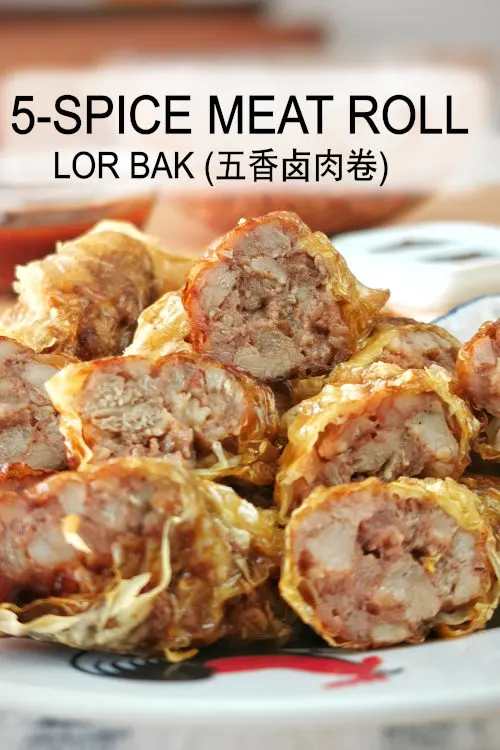
3. Deep-fry the Lor Bak
The final step is to deep-fry these Ngor Hiang meat rolls.
- Heat some vegetable oil in a wok or a large skillet. Make sure you use oil enough to submerge the meat rolls. You can also use a non-stick pan with less oil.
- Place the meat rolls in the oil, and do not let them from touching each other.
- Deep-fry the meat rolls in medium heat oil until golden brown on both sides.
- Place the meat rolls on a paper towel to remove the excess oil.
- Place the Lor Bak on a cutting board. Cut diagonally it into small pieces (one inch in length) to serve on its own or with chili sauce and the dipping sauce, as mentioned in the next section.
Note:
You can keep the uncooked Lor Bak in the freezer if you are not deep-frying them immediately. In this case, thaw it until they return to room temperature before deep-frying them.
4. The Lor Bak dipping sauce
The dipping sauce is optional as the meat rolls are packed with flavor. However, if you prefer to serve it with a dipping sauce, here is a simple recipe.
- Heat 1 cup of water (or chicken broth) in a small pot.
- Add 1 tsp of five-spice powder, 1 tsp dark soy sauce, and 2 tsp sugar.
- Bring it to a boil, and thicken it with cornstarch slurry to form a thick gravy.
- Add a quarter of a beaten egg and stir swiftly to form strands of egg strips, the same way as making Chinese egg drop soup. (Note: the egg is optional).
More recipe for you
Here are two hand-picked recipes since you like beancurd skin.
- Beancurd skin roll. This Chinese dim sim is prepared with the beancurd sheet in this recipe. You will love it if you like the beancurd sheet!
- Buddha’s delight. It is a classic vegetarian recipe popular during festive seasons such as Chinese New Year.
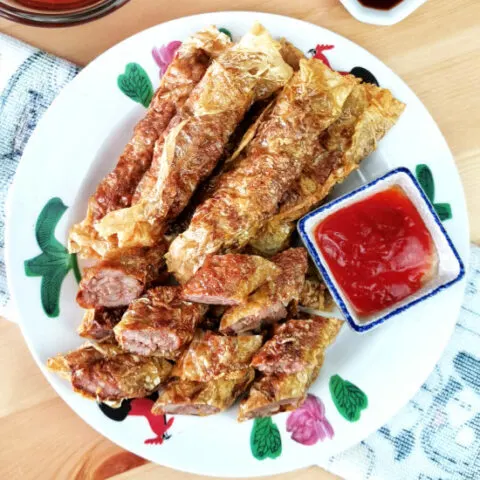
Lor Bak - How to make five-spice pork rolls
Lor Bak is a meat roll wrapped in beancurd skin, seasoning with Chinese five-spice powder, and deep-fry until crispy.
It is a famous street food popular in Malaysia, particularly among the Chinese.
You are likely to get the best Lor Bak in Penang. If you are a Malaysian living abroad, who craves Lor Bak, or anyone who just wants to make it at home, here is the recipe.
Ingredients
- 1 large bean curd sheet
- 400g pork shoulder or pork belly
- 100g shrimp meat
- 2 water chestnuts
- 1 medium-size onion
- 4 cloves garlic
- 1.5 tsp 5-spice powder
- 1.5 tsp salt
- 1.5 tsp sugar
- 1 egg
- 1/4 tsp ground white pepper
- 1 tbsp light soy sauce
- 1 tbsp Shaoxing wine
- 1 tbsp all-purpose flour
Instructions
Prepare the stuffing
- Cut the pork and shrimp into small dice.
- Chop some garlic.
- Cut the onion into small dice.
- Peel the water chestnuts, and cut them into small pieces.
- Season the bove ingredients with light soy sauce, ground white pepper, five-spice powder, Shaoxing wine, sugar, and salt.
- Add an egg plus the all-purpose flour to combine all the ingredients thoroughly.
- Set aside to marinate the stuffing for an hour
Wrap the stuffing with the bean curd sheet
- Cut the beancurd sheet into small pieces, about the size slightly large than your palm, preferably a rectangle.
- Apply some water to the bean curd sheet to soften it before using it to wrap the stuffing.
- Place a portion of the stuffing near one end of the shorter sides of the beancurd sheet. The filling should have half an inch clearance from the sides.
- Prepare a thick cornstarch slurry. Apply the starch slurry to all sides of the bean curd sheet.
- Roll up the bean curd sheet to encase the stuffing.
- Flatten both sides to seal the stuffing inside the bean curd sheet.
Deep-fry the Lor Bak
- Heat some vegetable oil in a wok.
- Deep-fry the meat rolls in medium heat oil until golden brown on both sides.
- Place the meat rolls on a paper towel to remove the excess oil.
- Cut the Lor Bak diagonally into small pieces (one inch in length) to serve.
Recommended Products
As an Amazon Associate and member of other affiliate programs, I earn from qualifying purchases.
-
 Pre-Seasshioned Cast Iron Skillet 2-Piece Set (10-Inch and 12-Inch) Oven Safe Cookware - 2 Heat-Resistant Holders - Indoor and Outdoor Use - Grill, Stovetop, Induction Safe
Pre-Seasshioned Cast Iron Skillet 2-Piece Set (10-Inch and 12-Inch) Oven Safe Cookware - 2 Heat-Resistant Holders - Indoor and Outdoor Use - Grill, Stovetop, Induction Safe -
 EXTRA LARGE Organic Bamboo Cutting Board with Juice Groove - Kitchen Chopping Board for Meat (Butcher Block) Cheese and Vegetables | Anti Microbial Heavy Duty Serving Tray w/Handles - 18 x 12"
EXTRA LARGE Organic Bamboo Cutting Board with Juice Groove - Kitchen Chopping Board for Meat (Butcher Block) Cheese and Vegetables | Anti Microbial Heavy Duty Serving Tray w/Handles - 18 x 12" -
 OUYANGHENGZHI Dried Fried Soybean Tofu Skin Vegan Food You Dou Pi 油豆皮 150g/5.29oz
OUYANGHENGZHI Dried Fried Soybean Tofu Skin Vegan Food You Dou Pi 油豆皮 150g/5.29oz -
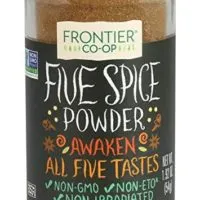 Frontier Five Spice Powder, 1.92-Ounce Bottle
Frontier Five Spice Powder, 1.92-Ounce Bottle
Nutrition Information:
Yield: 16 Serving Size: 1Amount Per Serving: Calories: 131Total Fat: 7gSaturated Fat: 3gTrans Fat: 0gUnsaturated Fat: 4gCholesterol: 55mgSodium: 396mgCarbohydrates: 6gFiber: 1gSugar: 1gProtein: 11g
This data was provided and calculated by Nutritionix on 8/7/2022

10 Best food in Penang- must-try street food & restaurants
Sunday 11th of August 2024
[…] is equally delicious despite not being the restaurant’s signature dish. We also ordered the five-spiced lor (five-spice pork rolls) bak. The restaurant has also received the Bib Gourmand status from the Michelin Star […]
Catherine
Thursday 23rd of February 2023
Do i use the smooth or rough side of the beancurd skin to put in the filling?
KP Kwan
Wednesday 1st of March 2023
I would use either side as I think which side to use is not critical.
KP Kwan
Saturday 9th of July 2022
Hi, this is KP Kwan. I am happy to see you in this comment area, as you have read through my recipe. I am glad to reply to any questions and comments as soon as possible.